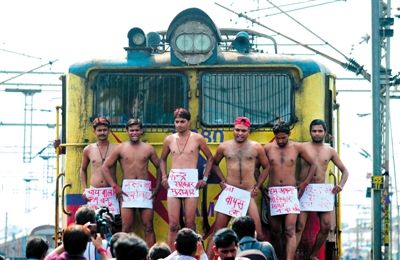NEW DELHI — Please mark the answer that bestrepresents the truth (as this is not to ascertain yourideology, but your aptitude for a job with greatperks).
新德里——请标出最能代表事实的一个答案(这道题所要考察的并不是你的意识形态,而是你是否具有从事一项待遇超赞的工作所需的资质)。
English is a foreign language.
英语是一门外语。
A) True. It came from outside India.
A) 对。它来自印度之外。
B) False. The former prime minister Manmohan Singh and the former deputy prime ministerL.K. Advani also came from elsewhere, but they are Indian now. A language belongs where itlives.
B) 错。印度前总理曼莫汉·辛格(Manmohan Singh)和前副总理L·K·阿德瓦尼(L. K. Advani)也来自别的地方,但现在他们都是印度人。一门语言存在于哪里就属于哪里。
C) True. English is foreign because it is not the mother tongue of the vast majority of Indians.
C) 对。英语是外语,因为它并非绝大多数印度人的母语。
D) False. English is in fact India’s only national language, far more influential than even Hindi.
D) 错。英语是印度的官方语言,其影响力甚至比印地语还大得多。
E) All of the above.
E) 以上皆对。

This question has yet to appear in any objective-type exam, but it has long bothered Indiansociety and is at the heart of a protest by hundreds of young Indians who are objecting to,among other things, the intrusion of English in one of India’s most prestigious tests — the civilservices examination. To be precise, they are protesting one of the two screening tests thathundreds of thousands take every year to qualify for the “main” exams. Only a few hundredsurvive, to be inducted into a system that may eventually take them to the top levels ofbureaucracy.
这个题目迄今尚未在任何客观题考试中出现过,但它长期以来一直困扰着印度社会,现在还成了一场示威活动的中心议题。示威活动的发起者是数百名印度青年,他们正就英语对印度最富盛名的考试之一——公务员考试——的入侵以及其他一些事项提出抗议。确切地说,他们抗议的是每年都有数十万人为取得进入“主试”的资格而参加的两场初试中的一场。只有数百名人能在公务员考试中幸存下来,进而被吸纳进一个最终有可能会把他们带到官僚体制顶端的体系。
Candidates have the option of taking the screening tests in English or Hindi, but even the Hindiversion has passages in English to test their comprehension of that language. Hundreds ofcandidates who have taken the tests and failed, or aspire to take the tests, have hit the streetsof the capital protesting the English passages, which they say put those who are not proficientin English at a disadvantage. They have thrown stones and burned buses. They have also,oddly, held up protest signs in English.
考生可以选择以英语或者印地语参加初试,但为了考察他们对英语的理解力,即便是印地语版本的试卷里也有英语短文。数百名参加了初试但没能考过或者有意参加初试的考生已走上首都街头,就试卷里的英语短文提出抗议,他们说这些短文让他们这样的对英语并不精通的人处于劣势。除了扔石头、烧汽车,他们还举着以英语写就的抗议标语——让人感觉有点奇怪。
Any battle against English in India is at once a battle of the poor against the rich, the villageagainst the city, tradition against modernity and the regional elite against a more cosmopolitanelite. On Monday, the government tried to placate the mobs by announcing that the Englishpassages would be scrapped, but as the protesters have other demands, they have not endedtheir agitation.
在印度,任何反对英语的战斗都会立刻演变成穷人反对富人的战斗、农村反对城市的战斗、传统反对现代的战斗,以及地方精英反对更为国际化的精英群体的战斗。周一,印度政府试图通过宣布将把英文短文从试卷中删除的消息来安抚民心。但示威者还有其他诉求,骚动并未得到平息。
The general opinion among bureaucrats is that the protesters are a disgrace. Srivatsa Krishna,a civil servant, wrote in The Times of India that the government should study the video footageof the protesters, “identify the specific culprits and ban them for life” from taking the exams.He found it ridiculous that the exam’s candidates would protest a requirement to possess“English skills of 10th-class levels.”
印度官僚普遍认为抗议者很丢脸。一个名叫施瑞瓦察·克里希纳(Srivatsa Krishna)的公务员在《印度时报》(The Times of India)上撰文称,政府应该研究一下示威者的录像,“锁定具体的犯事者,罚他们终身禁考”。他认为,考生们要是反对一条要求其“英语能力达到10年级水平”的规定,那简直太荒唐了。
In almost every state in India, the guardians of culture have tried to restrain the growth ofEnglish, but its power has only grown because of its promise of material and social benefits.Most of the cultural guardians themselves send their children to English-language schools. Themedium of instruction for higher education in India is almost entirely English.
几乎在印度的每一个邦,文化卫道士们都在竭力抵制英语的崛起,但这门语言的影响力反而不断扩大,因为它能带来物质利益和社会效益。大多数文化卫道士本人也会把孩子送进英语学校学习。印度的高等教育学府所采用的教学语言几乎全都是英语。
A politician, Yogendra Yadav, lamented in The Indian Express that “the entire system of highereducation that controls white-collar jobs” is loaded against students who did not attendEnglish-language schools. But then, that is the reality of the nation. The dominance of Englishdims the prospects of students who are too poor to attend an English-language school. But thegovernment, for various reasons, including cultural prejudice, has not done enough to takeEnglish to its poorest. Most of its free or cheap schools do not have English as the medium ofinstruction.
政治学家约根德拉·亚达夫(Yogendra Yadav)曾在《印度快报》(The Indian Express)上感慨:“培养未来白领的整个高等教育体系”让没上过英语学校的学生处于劣势。但这就是这个国家的现实。英语的主导地位让因为太穷而无法在英语学校就读的学生前途无“亮”。然而,出于各种各样的原因——其中包括文化偏见,在让最为贫困的学生接触到英语这件事上,印度政府做得还不够。该国大多数免费或者费用便宜的学校所采用的教学语言都不是英语。
In South India, there have been no protests against the English passages. Historically, thatregion has protested against the supremacy of Hindi. When Prime Minister Narendra Modi gavehis first public speech in the south after assuming office, he spoke in English.
印度南部并未发生针对英语短文的抗议活动。从历史上看,该地区一直在抗议印地语的一家独大。纳伦德拉·莫迪(Narendra Modi)总理上任后首次在南部地区发表公开演讲时,说的是英语。
English is indisputably Indian now, and the most useful language in India. But it is not the mostbeloved, nor the medium of abuse during road rage. That special place Indians will alwaysgrant only to their mother tongues.
英语现在是印度人的语言,同时也是印度国内最实用的语言,这一点毫无争议。但它并不是最受喜爱的语言;路怒症发作时,人们也不会用英语骂人。在这种特别的情境下,印度人永远只会说母语。
So the correct answer is “E.”
所以,正确答案应该是“E”。
本文关键字: 第二大语言英语在印度的矛盾地位
 免费试听
免费试听

时长 : 29:45 主讲 : 乔迪

时长 : 44:09 主讲 : 徐宸

时长 : 21:15 主讲 : 徐宸

时长 : 21:15 主讲 : 徐宸

时长 : 44:09 主讲 : 徐宸

时长 : 29:45 主讲 : 乔迪

时长 : 15:31 主讲 : 徐新磊

时长 : 18:37 主讲 : 孔令金

时长 : 15:31 主讲 : 徐新磊
 推荐阅读
推荐阅读
第十三届全国人民代表大会第二次会议(the second session of the 13th National People& 39;s Congress)5日上午在人民大会堂开
第十三届全国人民代表大会第二次会议(the second session of the 13th National People& 39;s Congress)5日上午在人民大会堂开
第十三届全国人民代表大会第二次会议(the second session of the 13th National People& 39;s Congress)5日上午在人民大会堂开
第十三届全国人民代表大会第二次会议(the second session of the 13th National People& 39;s Congress)5日上午在人民大会堂开
第十三届全国人民代表大会第二次会议(the second session of the 13th National People& 39;s Congress)5日上午在人民大会堂开
第十三届全国人民代表大会第二次会议(the second session of the 13th National People& 39;s Congress)5日上午在人民大会堂开
第十三届全国人民代表大会第二次会议(the second session of the 13th National People& 39;s Congress)5日上午在人民大会堂开
第十三届全国人民代表大会第二次会议(the second session of the 13th National People& 39;s Congress)5日上午在人民大会堂开
第十三届全国人民代表大会第二次会议(the second session of the 13th National People& 39;s Congress)5日上午在人民大会堂开
第十三届全国人民代表大会第二次会议(the second session of the 13th National People& 39;s Congress)5日上午在人民大会堂开
